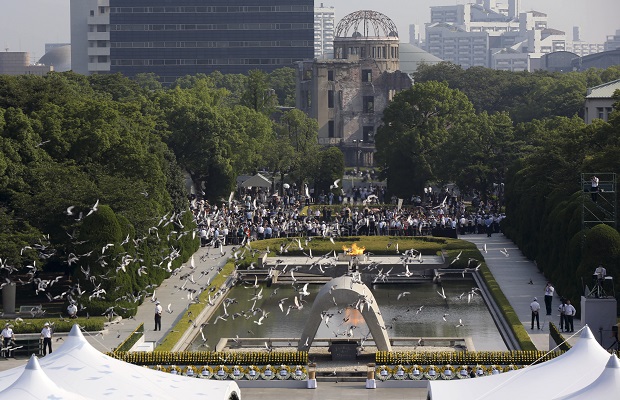Japan marks 70th anniversary of Hiroshima atomic bombing

Doves fly over the cenotaph dedicated to the victims of the atomic bombing at the Hiroshima Peace Memorial Park during the ceremony to mark the 70th anniversary of the bombing in Hiroshima, western Japan Thursday, Aug. 6, 2015. AP
HIROSHIMA, Japan – Bells tolled in Hiroshima on Thursday as Japan marked 70 years since the atomic bombing that helped end World War II but still divides opinion today on whether the total destruction it caused was justified.
Prime Minister Shinzo Abe and foreign delegates were among the tens of thousands gathered in Hiroshima’s Peace Memorial Park to observe a moment of silence at 8:15 am local time (2315 GMT), when the detonation turned the western Japanese city into an inferno.
The now-bustling city’s mayor Kazumi Matsui said nuclear weapons were an “absolute evil” as he urged the world to put an end to them forever.
“To coexist we must abolish the absolute evil and ultimate inhumanity that are nuclear weapons. Now is the time to start taking action,” he said in his annual speech.
‘Little Boy’
Article continues after this advertisementAn American B-29 bomber named Enola Gay dropped an atomic bomb, dubbed “Little Boy”, on Hiroshima on August 6, 1945.
Article continues after this advertisementNearly everything around it was incinerated, with the ground level hit by a wall of heat up to 4,000 degrees Celsius — hot enough to melt steel.
About 140,000 people are estimated to have been killed in the attack, including those who survived the bombing itself but died in the following days, weeks and months from severe radiation exposure.
On August 9, the port city of Nagasaki was also attacked with an atomic bomb, killing more than 70,000 people.
Japan surrendered days later — on August 15, 1945 — bringing the war to a close.
Abe laid a wreath at the ceremony attended by US ambassador to Japan Caroline Kennedy and other officials.
Under-secretary for arms control Rose Gottemoeller was also scheduled to attend, the most senior US official sent from Washington to the annual memorial.